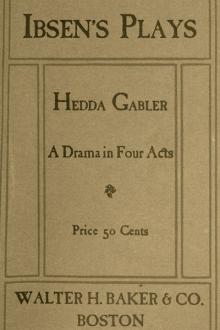Early Plays - Henrik Ibsen (my miracle luna book free read .TXT) 📗

- Author: Henrik Ibsen
Book online «Early Plays - Henrik Ibsen (my miracle luna book free read .TXT) 📗». Author Henrik Ibsen
the superior character-delineation, and shows in considerable
detail the "inner necessity ... which brings about the change of
heart in Gandalf and his warriors."
The revision of _Catiline_ came twenty-five years after the
original version, and consisted largely of linguistic changes.
Ibsen seems never to have completely disowned this play; it has
been included in all the complete editions, whereas _The
Warrior's Barrow_ and _Olaf Liljekrans_ appear only in
the first complete edition, and were even then relegated to a
supplementary volume. In suggesting the revision of
_Catiline_, Ibsen proposed "to make no change in the thought
and ideas, but only in the language in which these are expressed;
for the verses are, as Brandes has somewhere remarked, bad,--one
reason being that the book was printed from my first rough
uncorrected draft."
Volume: 1 Pg 8
He had at that time not developed his
careful craftsmanship, and sought in the revision merely to put
the drama into the form which he had originally had in mind, but
which at that time he had been unable to achieve. The changes
that were actually made are summarized by D. A. Seip (Ibsen,
_Samlede Digter Verker_, 1918, VII, 114) who quotes Halvdan
Koht and Julius Elias (Ibsen, _Efterladte Skrifter_, III):
"The two editions 'agree in the sequence of tenses, with a few
exceptions also in the sequence of speeches, and on the whole
even in the sequence of lines. The changes involve principally
the poetic expression itself; after the second act they become
more and more extensive, and the last two acts have been
augmented with 100 lines.' ... Not infrequently there appear
words and expressions which are suggestive of Ibsen's later
works."
These plays now appear for the first time in English translation.
Johnstone published in _Translations from the Norse, by a S. S._ (Gloucester, about 1876), an English rendering ofthe first act of _Catiline_ and a synopsis of the last two
acts. William Archer explains at length his omission of
_Catiline_ from his edition of Ibsen. "A great part of the
interest lies in the very crudities of its style, which it would
be a thankless task to reproduce in translation.
Volume: 1 Pg 9
Moreover, the
poet impaired even its biographical value by largely rewriting it
before publication. He did not make it, or attempt to make it, a
better play, but he in some measure corrected its juvenility of
expression. Which version, then, should a translator choose? To
go back to the original would seem a deliberate disregard of the
poet's wishes; while, on the other hand, the retouched version is
clearly of far inferior interest. It seems advisable, therefore,
to leave the play alone, as far as this edition is concerned."
_Olaf Liljekrans_ and _The Warrior's Barrow_ were acted
in English in London in 1911 and 1912 respectively, but the
English renderings used in these presentations have never
appeared in print.
The text of _Catiline_ in the present translation is that of
the revised version as given in the edition of 1906-07; the text
of the other two plays is that of the edition of 1898-1902. The
meters of the original have been carefully reproduced. The great
difficulty of rendering the ballad and lyrical meters of Ibsen
into adequate English verse has made some stylistic changes
necessary, such as the substitution of masculine for feminine
rhymes, and the occasional alteration of the sense in slight
measure.
I take this opportunity to acknowledge my gratitude to Professor
W. Firkins, now of _The Weekly Review_, who suggested thetranslating of these plays and who offered from time to time
invaluable criticisms; to Professor Howard M. Jones, of the
University of Texas, Professor S. B. Hustvedt, of the University
of Minnesota, and Professor W. W. Lawrence, of Columbia
University, who read all or parts of these translations and made
many helpful suggestions; and to Professor G. P. Krapp, of
Columbia University, and my wife, who were of assistance in
various ways.
CATILINE_ ACT1
[The Flaminian Way outside of Rome. Off the road a
wooded hillside. In the background loom the walls and
the heights of the city. It is evening.]
[CATILINE stands on the hill among the bushes, leaning
against a tree.]
CATILINE. I must! I must! A voice deep in my soul
Urges me on,--and I will heed its call.
Courage I have and strength for something better,
Something far nobler than this present life,--
A series of unbridled dissipations--!
No, no; they do not satisfy the yearning soul.
CATILINE. I rave and rave,--long only to forget.
'Tis past now,--all is past! Life has no aim.
CATILINE. [After a pause.]
And what became of all my youthful dreams?
Like flitting summer clouds they disappeared,
Left naught behind but sorrow and remorse;--
Each daring hope in turn fate robbed me of.
[He strikes his forehead.]
CATILINE. Despise yourself! Catiline, scorn yourself!
You feel exalted powers in your soul;--
And yet what is the goal of all your struggle?
The surfeiting of sensual desires.
CATILINE. [More calmly.]
But there are times, such as the present hour,
When secret longings kindle in my breast.
Ah, when I gaze on yonder city, Rome,
The proud, the rich,--and when I see that ruin
And wretchedness to which it now is sunk
Loom up before me like the flaming sun,--
Then loudly calls a voice within my soul:
Up, Catiline;--awake and be a man!
CATILINE. [Abruptly.] Ah, these are but delusions of the night,
Mere dreaming phantoms born of solitude.
At the slightest sound from grim reality,--
They flee into the silent depths within.
[The ambassadors of the Allobroges, AMBIORIX and OLLOVICO, with
their Escort, come down the highway without noticing CATILINE.]
AMBIORIX. Behold our journey's end! The walls of Rome!
To heaven aspires the lofty Capitol.
OLLOVICO. So that is Rome? Italy's overlord,
Germany's soon,--and Gaul's as well, perchance.
AMBIORIX. Ah, yes, alas;--so it may prove betimes;
The sovereign power of Rome is merciless;
It crushes all it conquers, down to earth.
Now shall we see what lot we may expect:
If here be help against the wrongs at home,
And peace and justice for our native land.
OLLOVICO. It will be granted us.
AMBIORIX. So let us hope;
For we know nothing yet with certainty.
OLLOVICO. You fear somewhat, it seems?
AMBIORIX. And with good reason.
Jealous was ever Rome of her great power.
And bear in mind, this proud and haughty realm
Is not by chieftains ruled, as is our land.
At home the wise man or the warrior reigns,--
The first in wisdom and in war the foremost;
Him choose we as the leader of our people,
As arbiter and ruler of our tribe.
But here--
CATILINE. [Calls down to them.]
--Here might and selfishness hold sway;--
Intrigue and craft are here the keys to power.
OLLOVICO. Woe to us, brethren, woe! He spies upon us.
AMBIORIX. [To CATILINE.]
Is such the practice of the high-born Roman?
A woman's trick we hold it in our nation.
CATILINE. [comes down on the road.]
Ah, have no fear;--spying is not my business;
By chance it was I heard your conversation.--
Come you from Allobrogia far away?
Justice you think to find in Rome? Ah, never!
Turn home again! Here tyranny holds sway,
And rank injustice lords it more than ever.
Republic to be sure it is in name;
And yet all men are slaves who cringe and cower,
Vassals involved in debt, who must acclaim
A venal senate--ruled by greed and power.
Gone is the social consciousness of old,
The magnanimity of former ages;--
Security and life are favors sold,
Which must be bargained for with hire and wages.
Not righteousness, but power here holds sway;
The noble man is lost among the gilded--
AMBIORIX. But say,--who then are you to tear away
The pillars of the hope on which we builded?
CATILINE. A man who burns in freedom's holy zeal;
An enemy of all unrighteous power;
Friend of the helpless trodden under heel,--
Eager to hurl the mighty from their tower.
AMBIORIX. The noble race of Rome--? Ah, Roman, speak--
Since we are strangers here you would deceive us?
Is Rome no more the guardian of the weak,
The dread of tyrants,--ready to relieve us?
CATILINE. [Points towards the city and speaks.]
Behold the mighty Capitol that towers
On yonder heights in haughty majesty.
See, in the glow of evening how it lowers,
Tinged with the last rays of the western sky.--
So too Rome's evening glow is fast declining,
Her freedom now is thraldom, dark as night.--
Yet in her sky a sun will soon be shining,
Before which darkness quick will take its flight.
[He goes.]
* * * * *
[A colonnade in Rome.]
[LENTULUS, STATILIUS, COEPARIUS, and CETHEGUS enter,
in eager conversation.]
COEPARIUS. Yes, you are right; things go from bad to worse;
And what the end will be I do not know.
CETHEGUS. Bah! I am not concerned about the end.
The fleeting moment I enjoy; each cup
Of pleasure as it comes I empty,--letting
All else go on to ruin as it will.
LENTULUS. Happy is he who can. I am not blessed
With your indifference, that can outface
The day when nothing shall be left us more,
Nothing with which to pay the final score.
STATILIUS. And not the faintest glimpse of better things!
Yet it is true: a mode of life like ours--
CETHEGUS. Enough of that!
LENTULUS. Today because of debt
The last of my inheritance was seized.
CETHEGUS. Enough of sorrow and complaint! Come, friends!
We'll drown them in a merry drinking bout!
COEPARIUS. Yes, let us drink. Come, come, my merry comrades!
LENTULUS. A moment, friends; I see old Manlius yonder,--
Seeking us out, I think, as is his wont.
MANLIUS. [Enters impetuously.]
Confound the shabby dogs, the paltry scoundrels!
Justice and fairness they no longer know!
LENTULUS. Come, what has happened? Wherefore so embittered?
STATILIUS. Have usurers been plaguing you as well?
MANLIUS. Something quite different. As you all know,
I served with honor among Sulla's troops;
A bit of meadow land was my reward.
And when the war was at an end, I lived
Thereon; it furnished me my daily bread.
Now is it taken from me! Laws decree--
State property shall to the state revert
For equal distribution. Theft, I say,--
It is rank robbery and nothing else!
Their greed is all they seek to satisfy.
COEPARIUS. Thus with our rights they sport to please themselves.
The mighty always dare do what they will.
CETHEGUS. [Gaily.] Hard luck for Manlius! Yet, a worse mishap
Has come to me, as I shall now relate.
Listen,--you know my pretty mistress, Livia,--
The little wretch has broken faith with me,
Just now when I had squandered for her sake
The slender wealth that still remained to me.
STATILIUS. Extravagance--the cause of your undoing.
CETHEGUS. Well, as you please; but I will not forego
My own desires; these, while the day is fair,
To their full measure I will satisfy.
MANLIUS. And I who fought so bravely for the glory
And might which now





Comments (0)